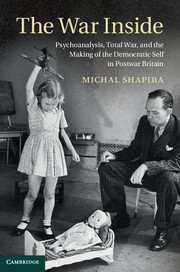Description
The War Inside
Psychoanalysis, Total War, and the Making of the Democratic Self in Postwar Britain
Studies in the Social and Cultural History of Modern Warfare Series
Author: Shapira Michal
A groundbreaking study of how British psychoanalysis shaped democracy, childhood and the family during and after the Second World War.
Language: English
Subject for The War Inside:
Approximative price 112.79 €
In Print (Delivery period: 14 days).
Add to cart
The War Inside
Publication date: 09-2013
284 p. · 15.8x23.4 cm · Hardback
Publication date: 09-2013
284 p. · 15.8x23.4 cm · Hardback
Approximative price 34.17 €
In Print (Delivery period: 14 days).
Add to cart
The War Inside
Publication date: 05-2015
Support: Print on demand
Publication date: 05-2015
Support: Print on demand
Description
/li>Contents
/li>Biography
/li>
The War Inside is a groundbreaking history of the contribution of British psychoanalysis to the making of social democracy, childhood, and the family during World War II and the postwar reconstruction. Psychoanalysts informed understandings not only of individuals, but also of broader political questions. By asserting a link between a real 'war outside' and an emotional 'war inside', psychoanalysts contributed to an increased state responsibility for citizens' mental health. They made understanding children and the mother-child relationship key to the successful creation of a democratic citizenry. Using rich archival sources, the book revises the common view of psychoanalysis as an elite discipline by taking it out of the clinic and into the war nursery, the juvenile court, the state welfare committee, and the children's hospital. It traces the work of the second generation of psychoanalysts after Freud in response to total war and explores its broad postwar effects on British society.
Introduction: the war inside; 1. The psychological study of anxiety: from World War I to World War II; 2. Under fire: children and psychoanalysts in total war; 3. The Hitler inside: Klein and her patients; 4. Psychoanalysts on the radio in war and peace: from collective to domestic citizenship; 5. Psychoanalyzing crime: the Institute for the Study and Treatment of Delinquency (ISTD), 1931–45; 6. Towards the therapeutic state: the ISTD during the postwar years, c.1945–60; 7. Hospitalized children, separation anxiety, and motherly love: psychoanalysis in postwar Britain; Bibliography.
Michal Shapira is Assistant Professor of History and Gender Studies at Tel Aviv University. Her research deals with the domestic, sociocultural, crossnational and imperial legacies of World War II in Britain and beyond.
© 2024 LAVOISIER S.A.S.




